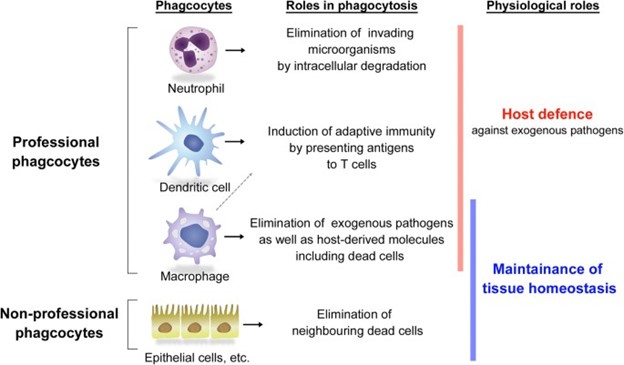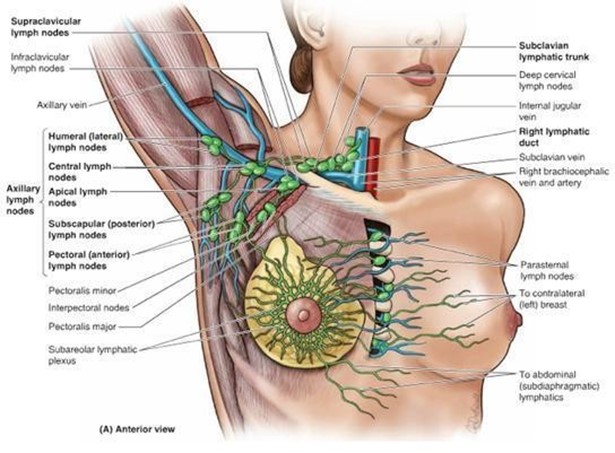After an infection, many dead and fragmented bacterial cells must be filtered from the body.
Which of the following cells will clear out the cell debris?
Lymphocytes.
Cytokines.
Mast cells.
Macrophages.
The Correct Answer is D
Macrophages are the main cells that clear out the cell debris by phagocytosis, a process that involves recognition, engulfment, and degradation of the disposable particles.

Macrophages are professional phagocytes that can be found in various tissues and organs, where they perform efferocytosis, the removal of dead and dying cells.
Choice A is wrong because lymphocytes are not phagocytes, but rather immune cells that mediate adaptive immunity by producing antibodies or killing infected cells.
Choice B is wrong because cytokines are not cells, but rather soluble molecules that regulate inflammation and immunity by acting as signals between cells.
Choice C is wrong because mast cells are not primarily involved in clearing cell debris, but rather in allergic reactions and innate immunity by releasing histamine and other mediators.
Nursing Test Bank
Naxlex Comprehensive Predictor Exams
Related Questions
Correct Answer is A
Explanation
Excretion is the process of removing metabolic wastes or excrements from the body.
Metabolic wastes are substances left over from metabolic processes (such as cellular respiration) which cannot be used by the organism and must therefore be excreted.
These include nitrogen compounds, water, CO2, phosphates, sulphates, etc.
Choice B. Absorption is wrong because absorption is the process of taking in substances into the body or cells.
It is not related to the removal of waste.
Choice C. Metabolism is wrong because metabolism is the sum of all the chemical reactions that occur in an organism.
It is not a process of removing wastes, but rather producing them.
Choice D. Assimilation is wrong because assimilation is the process of incorporating substances into the body or cells.
It is also not related to the removal of waste.
Normal ranges for metabolic wastes vary depending on the type and concentration of the waste, as well as the organism and its environment.
For example, ammonia is a very toxic waste that requires a lot of water for its excretion, while uric acid is a less toxic waste that can be concentrated into a small volume.
Some normal ranges for human metabolic wastes are:
Urea: 2.5 to 6.4 mmol/L in blood serum Uric acid: 3.4 to 7.2 mg/dL in blood serum Creatinine: 0.6 to 1.2 mg/dL in blood serum CO2: 35 to 45 mmHg in arterial blood gas
Correct Answer is A
Explanation
The lymph nodes of the axillary region receive lymph mainly from the upper limb and mammary gland.
This is because the axillary lymph nodes are located in the armpit area and drain the lymph vessels from the lateral quadrants of the breast and the arm.

Choice B is wrong because the abdominal viscera are drained by the celiac, superior mesenteric, and inferior mesenteric lymph nodes.
Choice C is wrong because the scalp and face are drained by the cervical lymph nodes.
Choice D is wrong because the thoracic viscera are drained by the bronchopulmonary, tracheobronchial, parasternal, and posterior mediastinal lymph nodes.
Whether you are a student looking to ace your exams or a practicing nurse seeking to enhance your expertise , our nursing education contents will empower you with the confidence and competence to make a difference in the lives of patients and become a respected leader in the healthcare field.
Visit Naxlex, invest in your future and unlock endless possibilities with our unparalleled nursing education contents today
Report Wrong Answer on the Current Question
Do you disagree with the answer? If yes, what is your expected answer? Explain.
Kindly be descriptive with the issue you are facing.
